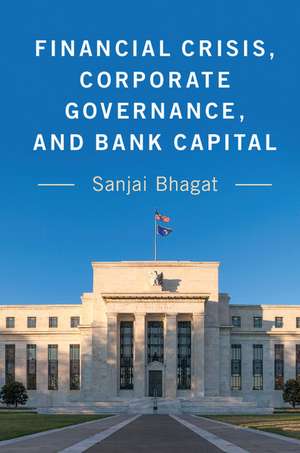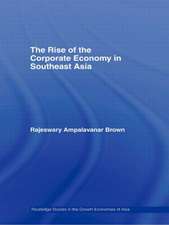Financial Crisis, Corporate Governance, and Bank Capital
Autor Sanjai Bhagaten Limba Engleză Hardback – 9 mar 2017
Preț: 321.14 lei
Nou
Puncte Express: 482
Preț estimativ în valută:
61.45€ • 64.33$ • 50.85£
61.45€ • 64.33$ • 50.85£
Carte tipărită la comandă
Livrare economică 07-21 aprilie
Preluare comenzi: 021 569.72.76
Specificații
ISBN-13: 9781107170643
ISBN-10: 1107170648
Pagini: 256
Ilustrații: 22 b/w illus.
Dimensiuni: 157 x 231 x 18 mm
Greutate: 0.5 kg
Editura: Cambridge University Press
Colecția Cambridge University Press
Locul publicării:New York, United States
ISBN-10: 1107170648
Pagini: 256
Ilustrații: 22 b/w illus.
Dimensiuni: 157 x 231 x 18 mm
Greutate: 0.5 kg
Editura: Cambridge University Press
Colecția Cambridge University Press
Locul publicării:New York, United States
Cuprins
1. Introduction; 2. Mortgage public policies: 'cause' of the crisis; 3. Pre-crisis executive compensation and misaligned incentives; 4. Managerial incentives hypothesis versus the unforeseen risk hypothesis; 5. Bank CEOs' buys and sells during 2000–8; 6. Executive compensation reform; 7. Director compensation policy; 8. Are large banks riskier?; 9. Bank capital structure and executive compensation; 10. Why banks should be mostly debt financed: parade of non sequiturs; 11. Conclusion.
Recenzii
'Bhagat shows that executives in large financial institutions benefited from excessive risk taking while investors and others were harmed. His proposal - protecting society through higher equity requirements and aligning managerial incentives better with long-term value creation - would help address the significant lingering distortions from 'too big to fail' institutions.' Anat R. Admati, Stanford University, California and co-author of The Bankers' New Clothes: What's Wrong with Banking and What to Do about It
'Economists have been successful in showing over time that people respond to incentives and disincentives. Professor Bhagat has applied this simple and successful idea to the compensation arrangements for the senior managers of banks, demonstrating with a powerful data-based analysis that it can alter their management strategies and affect the safety and soundness of the banks they manage. It deserves a try; thousands of pages of government regulations over more than 50 years certainly have not worked.' Peter J. Wallison, Arthur F. Burns Fellow in Financial Policy Studies, American Enterprise Institute, Washington, DC
'This book by Sanjai Bhagat is an excellent overview of the impressive body of research on how executive compensation interacts with other variables like bank size and bank capital to affect banking risk and bank fragility. These issues are of critical importance as bank regulators grapple with the task of recalibrating various aspects of regulation to enhance financial system stability. The book is rich in specific research-based executive compensation policy prescriptions for regulators to consider, and should prove to be a valuable resource for those interested in research on executive compensation in banking as well as for regulators.' Anjan Thakor, John E. Simon Professor of Finance and Director of the Wells Fargo Advisors Center for Finance and Accounting Research, Olin School of Business, Washington University in St. Louis
'As always, Professor Bhagat has written a thoughtful and insightful analysis of a difficult and pressing contemporary problem. His proposal for executive and director restricted equity-based compensation at our nation's financial institutions to prevent another crisis is intelligent, intuitive and compelling. I enthusiastically endorse the theory and the book.' Charles M. Elson, Edgar S. Woolard Jr. Chair in Finance and Director of John L. Weinberg Center for Corporate Governance, University of Delaware
'Sanjai's book and ideas underscore a key insight that bank shareholders and management at present have fairly limited ability to internalize the consequences of bank's risks on the economy at large: more equity and long-term incentives are necessary to complement the other regulatory reforms. The book provides a wealth of factual basis that make this insight compelling.' Viral V. Acharya, C. V. Starr Professor of Economics, New York University Stern School of Business
'Professor Bhagat's proposal to require restricted equity compensation for bank executives and to raise their banks' equity capital is backed by sound logic and extensive empirical evidence. This book by a renowned expert in corporate governance and compensation is a must read for anyone concerned with the problem of Too-Big-to-Fail banks.' George Pennacchi, Bailey Memorial Chair of Money, Banking, and Finance, University of Illinois
'Economists have been successful in showing over time that people respond to incentives and disincentives. Professor Bhagat has applied this simple and successful idea to the compensation arrangements for the senior managers of banks, demonstrating with a powerful data-based analysis that it can alter their management strategies and affect the safety and soundness of the banks they manage. It deserves a try; thousands of pages of government regulations over more than 50 years certainly have not worked.' Peter J. Wallison, Arthur F. Burns Fellow in Financial Policy Studies, American Enterprise Institute, Washington, DC
'This book by Sanjai Bhagat is an excellent overview of the impressive body of research on how executive compensation interacts with other variables like bank size and bank capital to affect banking risk and bank fragility. These issues are of critical importance as bank regulators grapple with the task of recalibrating various aspects of regulation to enhance financial system stability. The book is rich in specific research-based executive compensation policy prescriptions for regulators to consider, and should prove to be a valuable resource for those interested in research on executive compensation in banking as well as for regulators.' Anjan Thakor, John E. Simon Professor of Finance and Director of the Wells Fargo Advisors Center for Finance and Accounting Research, Olin School of Business, Washington University in St. Louis
'As always, Professor Bhagat has written a thoughtful and insightful analysis of a difficult and pressing contemporary problem. His proposal for executive and director restricted equity-based compensation at our nation's financial institutions to prevent another crisis is intelligent, intuitive and compelling. I enthusiastically endorse the theory and the book.' Charles M. Elson, Edgar S. Woolard Jr. Chair in Finance and Director of John L. Weinberg Center for Corporate Governance, University of Delaware
'Sanjai's book and ideas underscore a key insight that bank shareholders and management at present have fairly limited ability to internalize the consequences of bank's risks on the economy at large: more equity and long-term incentives are necessary to complement the other regulatory reforms. The book provides a wealth of factual basis that make this insight compelling.' Viral V. Acharya, C. V. Starr Professor of Economics, New York University Stern School of Business
'Professor Bhagat's proposal to require restricted equity compensation for bank executives and to raise their banks' equity capital is backed by sound logic and extensive empirical evidence. This book by a renowned expert in corporate governance and compensation is a must read for anyone concerned with the problem of Too-Big-to-Fail banks.' George Pennacchi, Bailey Memorial Chair of Money, Banking, and Finance, University of Illinois
Notă biografică
Descriere
This book proposes a solution to the 'too big to fail' problem that will help to prevent future financial crises.


















